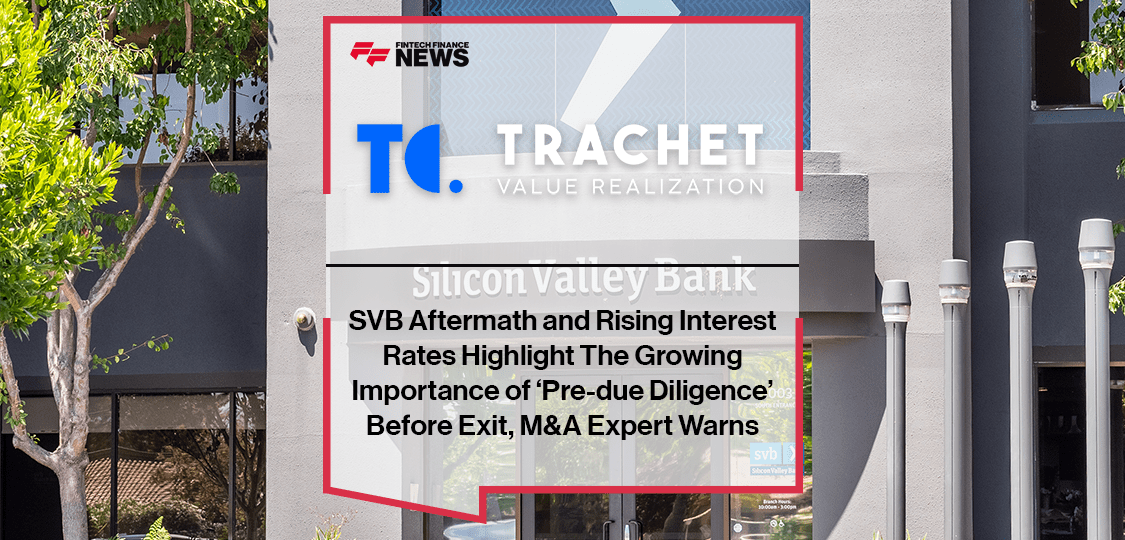Breaking News

SVB Aftermath and Rising Interest Rates Highlights Growing Importance of ‘Pre-due Diligence’ Before Exit, M&A Expert Warns
Claire Trachet, CEO of leading business advisory, Trachet, explains the common mistakes in the lead up to exit and gives her top tips for deal-proofing your business.
A new study from PitchBook-NVCA Venture Monitor has revealed that VC companies recorded only £5.8 billion in exits in Q1, less than 1% of the record exit value generated in 2021. This comes after deal-makers have become increasingly wary when it comes to investment opportunities, after the effects of Silicon Valley Bank’s (SVB) collapse rippled across the private markets. The study additionally found that the momentum of fundraising has come to halt, with merely $11.7bn closed across 99 funds, while late-stage deal value has dropped to a 21-quarter low, hitting just $11.6bn. In light of this, Claire Trachet, leading M&A expert and CEO/founder of business advisory, Trachet, explains why these figures have dropped, illustrating how – in a new-age economic climate defined by rising interest rates – startups can ensure their deal gets over the line.
According to data from Harvard Business Review, a staggering 70-90% of M&A fall through even during the best economic conditions. Trachet argues that this is because of “volume culture” which began post 2009 amongst the big firms, consequentlyleading to so many M&A falling through in the past. Due to the insecure nature of these deals, companies would take on as many clients and prospective deals as possible so that if one fell through, there would still be income from another transaction. By taking on a smaller advisory firm, founders are weighting the odds in their favour, as all of the adviser’s resource is likely going to be placed on that one M&A. Choosing the right partner to guide you through the process forms one important part of getting a deal over the line, but it’s also vital be informed as a founder too. With that in mind, Trachet shares some of the most common stumbling blocks for startups amidst the current M&A market, and explains how to combat them.
Due diligence is an opportunity – not something to be afraid of:
“The majority of deals fall through at the due diligence phase. Most commonly, this is because startups have not enlisted expert advice early enough to help them identify and resolve any issues. Contrastingly, rather than a part of the process to be afraid of, experienced advisers can actually even add value to a deal during the due diligence process, rather than have it slashed or thrown out entirely. The simple message here is prepare early, and bring in the right people to help you conduct ‘pre–due diligence‘. Think of this like a dress rehearsal before the real performance.”
Fit is important, enlist the help of a corporate matchmaker:
“Another key reason deals fall apart is due to a lack of alignment in terms of culture between the business and prospective acquirer. So, it’s of vital importance to get a good understanding of how the other party operates prior to getting deep into negotiations, otherwise problems can occur down the line. Sharing the same values and vision really helps in fostering a smooth negotiation process – all it can take at times is a bad feeling for a deal to fall through. This is where it is again invaluable having someone that has been through these processes before, and can source the ideal buyer for your company.”
Momentum is key, avoid hold-ups at all costs:
“I always stress to my clients the importance of being deal ready before heading into any potential transaction. The buyer has shown an interest in your firm at a particular moment in time, but a simple change in external market conditions could lead to them getting cold feet and pulling out. What that means is you need to have done all the necessary preparation before negotiations have started, to ensure the deal gets over the line quickly and smoothly.
“This has never been more important than in the current deals market where the environment can dramatically change over the course of just a few weeks. Another really important thing here is to both sign and close the deal at the same time, as this prevents anything putting the deal in jeopardy in between those two things happening.”
Issues can arise, mitigate this with a dual-track plan:
“Probably the most important bit of advice I can give is to have a dual-track plan in place – this means carrying out a fundraising round while simultaneously looking for M&A opportunities. In this way, if one avenue fails, startups will still be in the later stages of their other option and all is not lost. In what can be an unpredictable market currently, the importance of this approach cannot be understated.”
Have your finances in order and extend the runway, finding a buyer might take time:
“Finally, startups should focus on extending the runway, so to speak – be diligent with the business’s working capital by optimising cash flow, review the contracts you have with your clients and minimise accounts receivable. Applying this mentality to the whole of the organisation is going to be key in the next year, whether you’re entering a fundraising round or considering an exit, ideally startups should be doing both. Applying this mentality also can show potential buyers that you know how to be savvy with capital, which is becoming increasingly important in today’s climate.”
People In This Post
Companies In This Post
- Bluefin and Basis Theory Partner to Enable Unified Tokenization Across Digital and In-Person Payments Read more
- Invest Bank and AUTON8 Build Partnership to Drive Digital Resilience and Banking Agility Read more
- ING’s AI Roadmap: Platform, People, and Agentic AI Read more
- UK-fintech Provided Over £17.5m in Emergency Wage Advances to More Than 55,000 Employees in the Last Year Read more
- TreviPay Announces AI-Powered Growth Center to Help Enterprises Predict Buyer Behavior and Drive B2B Sales Read more

















